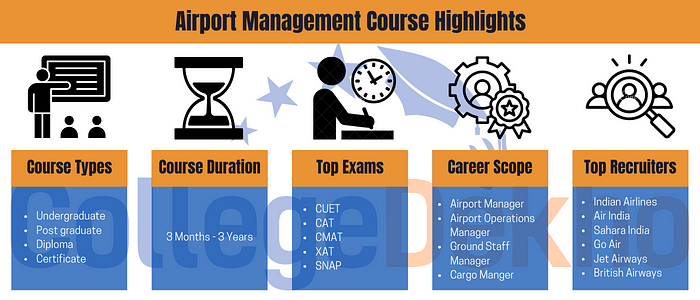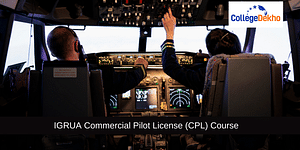Airport Management Courses
Airport Management courses are designed to prepare students for various administrative and operational roles within the aviation industry. The curriculum is structured to provide a comprehensive understanding of the business, technical aspects of running an airport, and the global aviation environment. Graduates of these courses can pursue careers in airport management, airline operations, air traffic control, and other aviation-related fields, equipped with the knowledge and skills needed to ensure the efficient and safe operation of airports worldwide.
What is an Airport Management Courses?
Airport Management courses are available at diploma, bachelor's, and master's levels, providing students with an optimal balance of theoretical knowledge and practical application, enriched by hands-on experience. Admission to Airport Management courses depends on merit-based selection or performance in entrance exams, which vary according to each institution's requirements. Renowned institutions across the country, such as SRM University Chennai, LPU Jalandhar, G D Goenka University, AIMS Institute, and NIMS University, offer Airport Management courses tailored to different academic levels.
After completing the course, graduates can find various work opportunities, ranging from airport managers and cargo management specialists to airport customer service representatives and airport operations managers. If you have a passion for managing, organising, and engaging with the intricacies of airlines, airports, and travel, then this field holds immense promise for you. Find below complete details about the Airport Management syllabus, admission process, top colleges, fee structure, career opportunities, and more!
Airport Management Course Latest Updates
- CUET UG 2024 registration last date is March 26, 2024. The exam will be held from May 15 to May 31, 2024, in 295 cities across India and abroad.
- The CUCET 2024 Phase 1 exam is being conducted from October 20, 2023, to March 31, 2024. The CUCET 2024 registration last date is March 30, 2024.
- CAT 2023 result has been announced at iimcat.ac.in by IIM Lucknow. Candidates can log into the website using their CAT 2023 User ID and Password and download their scorecards.
- CMAT 2024 registration will begin soon, most likely in March 2024. NTA will announce the exam date along with the release of the application form.
Table of Contents
- What is an Airport Management Courses?
- Airport Management Course Latest Updates
- Airport Management Course Highlights
- Why Choose Airport Management Course?
- What is an Online Airport Management Course?
- Difference Between Airport Management and Aviation Management
- Types of Airport Management Courses
- Airport Management Eligibility Criteria
- Airport Management Entrance Exams
- Airport Management Admission Process in India
- What is Airport Management Course Fees?
- Airport Management Syllabus
- Top Airport Management Course Colleges in India
- Career Options After Airport Management Course
- Study Airport Management Abroad
- FAQs about Airport Management Courses
Airport Management Course Highlights
Check out the Airport Management course highlights stated below:
| Particulars | Details |
|---|---|
| Course Type | Diploma, Bachelor, Master |
| Admission Criteria |
|
| Course Duration | 1 year, 3 years, 2 years |
| Eligibility Criteria |
|
| Entrance Exams | CAT, CMAT, CUET, XAT, SNAP, etc. |
| Average Course Fee | INR 24,000 - 1,00,000 |
| Top Colleges in India | LPU Jalandhar, NIMS University, AIMS Institutes, IIT Delhi, IIM Bangalore and others |
| Top Colleges Abroad | University College Birmingham, Solan University, University of West London, Kansas State University, etc |
| Average Salary | 7 LPA |
| Job Roles | Airport Manager, Airport Operations Manager, Ground Staff Manager, Cargo Team Management, etc. |
| Top Recruiters | Air India, SpiceJet, Cargo Services, Domestic and International Airports, etc. |

Why Choose Airport Management Course?
Airport Management courses cover various aspects within a single framework, making it highly sought after. If you're unsure whether this course is the right fit for you, consider these benefits to help clarify your decision:
- A Blend of Theory and Practice: Airport Management courses strike a balance between theoretical concepts and practical application, ensuring that students gain hands-on experience, which is essential for success in the field.
- Diverse Career Opportunities: Airport Management graduates have access to various career opportunities within the aviation industry, such as airport operations, security management, commercial services, and more.
- Dynamic Industry: The aviation industry is constantly evolving, which presents exciting challenges and opportunities. By taking an Airport Management course, you will acquire the necessary skills and knowledge to navigate this dynamic sector effectively.
- Global Relevance: Airports are critical to global connectivity, making Airport Management skills highly sought-after worldwide. This course opens doors to opportunities both domestically and internationally.
- Industry Expertise: Airport Management courses are taught by experienced professionals and industry experts, providing valuable insights and real-world knowledge that are directly applicable to the industry.
What is an Online Airport Management Course?
An online Airport Management course is an excellent option for individuals who wish to pursue a career in airport management or enhance their knowledge and skills in this field. These courses are designed to provide students with comprehensive knowledge and practical skills necessary to manage different aspects of airport operations, administration, and strategic planning.
One of the significant benefits of an online Airport Management course is the flexibility it offers. Students can study at their own pace, from anywhere with an internet connection, and fit their studies around their work or personal commitments. The course delivery format usually includes interactive online lectures, case studies, simulations, and assessments to ensure students receive a comprehensive learning experience.
Difference Between Airport Management and Aviation Management
Airport Management and Aviation Management are often confused to be the same. But, these terms are as different as their course curriculum. So, check the difference between the two provided below:
| Airport Management | Aviation Management |
|---|---|
| In simple terms, Airport Management is the management of airlines and airports. | In simple terms, Aviation Management includes the study of airlines, airports and other businesses connected to it. |
| Airport Management is also enhancing its growth as it is one of the renowned career options. | The Scope of Aviation Management is growing in India and there are many investment plans undertaken for enhancing this field by the government. |
| In the Airport Management field, the sole objective revolves around the management of airport services which includes safety, efficiency, environment friendly and other aspects. | The main objective of Aviation Management ensures the smooth run of airline transports and other aviation services. |
| The common job roles in this domain are Airport Operations Manager, Airport Representative, Ground Staff Manager and others. | After completing any academic qualification level in Aviation Management, candidates can employ as Flight Attendants, Aerospace Technicians, Airline Piolets and various other roles. |
Types of Airport Management Courses
Airport Management courses are offered across various academic levels. The course can be undertaken at diploma, bachelor’s and master’s level. To know more about the same in-depth, check below:
| Course Level | Duration | Description |
|---|---|---|
| Certificate Course | 3-6 Months | Offers specialized training in airport management, including operations, security, and finance. Ideal for professionals looking to improve their skills or move into management roles. |
| Diploma Course | 1-2 Years | Offers broader training than certificates and covers topics related to airport management. They are ideal for individuals seeking entry-level positions in airport operations or management. |
| PG Diploma Course | 1-2 Years | Offers advanced training in airport management for those interested in specialized knowledge and skills in airport finance, planning, and operations. |
| Undergraduate Course | 3-4 Years | Provides a comprehensive education in airport operations, planning, finance, and related subjects. These programs take three to four years to complete and prepare students for roles in airport or airline management. |
| Postgraduate Course | 2 Years | Provides advanced education and training in topics related to airport management. These programs typically take two years to complete and may require a research thesis or capstone project. |
Airport Management Eligibility Criteria
The eligibility criteria of Airport Management differ for the level of academic qualification. These criteria also vary from college to college and students must be aware of the same before applying for any course. So, before applying for the programme, check these criteria below:
| Course Type | Eligibility Criteria |
|---|---|
| Certificate Course |
|
| Diploma Course |
|
| PG Diploma Course |
|
| Undergraduate Course |
|
| Postgraduate Course |
|
Required Skill Set for Airport Management
- Graduates require organisational skills, as they have to manage and plan many things in one go.
- A problem-solving approach will help the graduates of this discipline to analyse the situation and resolve any issues.
- Communication Skills are one of the significant skills for airport management graduates, as throughout their work journey, they have to interact with different people.
- Graduates must have knowledge of the field and the different aspects related to it. So, having in-depth knowledge of it will help you flourish in your career.
- Graduates with experience and expertise in the field can climb onto higher positions within this field. So, having the skill to manage and organise multiple teams and coordinate with them will be useful in the long run.
- Teamwork within any field or organisation is important. Without support from the team, an organisation cannot achieve a success rate.
Airport Management Entrance Exams
Numerous colleges in India offer admission to undergraduate and postgraduate Airport Management courses based on the scores of entrance exams. To become eligible for admission, prospective students must appear and qualify for the entrance exams accepted by their desired colleges. The top entrance exams conducted for UG and PG Airport Management courses in India are provided below.
Top Entrance Exams for PG Airport Management Courses
| Entrance Exam | Application Dates | Exam Date |
|---|---|---|
| CAT 2024 | August to September 2024 | November 24, 2024 (Expected) |
| CMAT 2024 | March 2024 | April/ May 2024 |
| XAT 2024 | July 15 to December 10, 2023 | January 7, 2024 |
| SNAP 2023 | August 23 to November 23, 2023 |
|
| NMAT by GMAC 2023 | August 1 to October 12, 2023 | October 10 to December 19, 2023 |
Top Entrance Exams for UG Airport Management Courses
| Name of the Exam | Application Opens | Application Closes | Exam Date |
|---|---|---|---|
| CUET UG 2024 | February 27, 2024 | March 26, 2024 | May 15 to 31, 2024 |
| SET BBA 2024 | December 13, 2023 | April 12, 2024 | Test 1: April 25, 2024 Test 2: April 30, 2024 |
| AIMA UGAT 2024 | January 4, 2024 | April 30, 2024 | May 4, 2024 |
| NMIMS NPAT 2024 | December 6, 2023 | May 20, 2024 | January 1 to May 25, 2024 |
Airport Management Admission Process in India
Admission to different levels of Airport Management is decided by the respective colleges or universities. The admission is also done either through merit or entrance examination. So, to know more about the process check below:
Undergraduate Course Admission Process
The admission process for undergraduate programs comprises several stages. Initially, applicants have to fill out an application form provided by the college or university. Alongside this form, they are required to submit essential documents such as academic certificates, proof of identity, etc. Moreover, depending on the admission requirements of the institution, they may also need to take an entrance examination or participate in an interview.
Postgraduate Course Admission Process
To apply for postgraduate programs, applicants need to fill out an application form that is provided by the institution and submit the required documents. Similar to undergraduate admissions, prospective students may have to take an entrance exam or attend an interview as part of the admission process. These evaluations are conducted to assess applicants' academic proficiency, knowledge and expertise in the chosen field of study, and determine whether they are a suitable fit for the program.
Diploma Course Admission Process
Enrolling in a diploma course is often less competitive and has a simpler admission process. Typically, candidates are not required to take entrance exams or attend interviews. Instead, they complete an application form provided by the institution. This makes diploma courses a great option for those who want to gain specialized skills and knowledge in a specific field without having to fulfil the rigorous prerequisites of an undergraduate program.
Certificate Course Admission Process
Admission to certificate courses is usually a simpler process compared to undergraduate or postgraduate programs. Typically, it involves filling out an application form provided by the institution or platform delivering the course. Certificate courses provide a valuable opportunity for individuals to acquire specialized skills and knowledge in a particular field or industry. The straightforward admission process enhances access to a diverse pool of candidates.
What is Airport Management Course Fees?
Airport Management Course offers different types of degrees including diploma, bachelor, and master levels. Well, the fees of the course depend on the level of qualification, institution, facilities, faculties and other factors. It is also said to be dependent on the duration of the course and the type of institution. However, to get an idea of the fee structure based on the type of institution check the information below:
| Course | Private College Fees (in INR) | Government College Fees (in INR) |
|---|---|---|
| Bachelor | 24,120 - 10.10 Lakh | 51,900 - 60 Lakh |
| Master | 24,120 - 15.72 Lakh | 6,500 - 60 Lakh |
| Diploma | 50,000 - 1 Lakh | NA |
Airport Management Syllabus
There are various subjects in the Airport Management course with different qualification levels such as bachelor, master, and diploma. While the syllabus differs from colleges and core curriculum, the basic bachelor's degree syllabus & subjects for three years or six semesters are given below:
| Semester 1 | Semester 2 | Semester 3 |
|---|---|---|
| Introduction to Aviation Industry | Airport Operations | Airport Functions of Airlines |
| Business Communication I | Business Statistics | Airport Security Management |
| Introduction to Management & Leadership | Travel Management | Airline and Airport Organisation |
| Business Mathematics | Human Resource Management | Aviation Law |
| Business Computing | Basics of Aviation | Travel Geography |
| Front Office Operations | Fire Management | Cargo Logistics and Management |
| Semester 4 | Semester 5 | Semester 6 |
| Business Communication II | Organisational Behaviour | Aircraft Maintenance Management |
| Consumer Behavior and Market Research | Essentials of Strategic Management | Airport Customer Services |
| Air Fares & Ticketing | Aircraft Maintenance & Crew Management | Aviation Resource Management |
| Customer Care Services | Airline Marketing & Aviation Safety Management | IT in the Airline Environment |
| Airline & Airport Housekeeping Operation | Load Planning & DGR | Industrial Training |
| Airport Ground Handling Operations | International Business | Dissertation |
Top Airport Management Course Colleges in India
In India, many colleges and universities are offering Airport Management courses. However, admission to this course depends on the college eligibility criteria, where you can either get admitted via merit or entrance result. So, before applying for this course, you can check the list of colleges offering this course in different levels below:
| Colleges for Diploma Course | Colleges for Bachelor Course | Colleges for Master Course |
|---|---|---|
| Academy of Aviation and Professional Excellence, Calicut | NIMS University | Indian Institute of Management, Ahmedabad |
| Skybird Aviation, Bangalore | Hindustan Aviation Academy | XLRI, Jamshedpur |
| Indira Gandhi Institute of Aeronautics | APG Shimla University | Indian Institute of Management, Lucknow |
| The Catalyst Academy | Vivekananda Global University | MDI Gurugram |
| PTC Aviation Academy, Chennai | Invertis University | Indian Institute of Technology, Delhi |
Career Options After Airport Management Course
After pursuing any academic qualification level such as a diploma or bachelor's or master’s degree, students have the option to land a job. However, this option is solely based on the candidate’s interest.
If someone has acquired a diploma programme in Airport Management, they may want to go further with their higher studies or do a job. Or if a bachelor’s graduate can pursue a master’s programme or land a job role based on their interest and ability. This cycle of education is evergrowing however, the stability to indulge in a job role is based on the experience, expertise and qualification level of the candidate.
The field of Airport Management enables the graduates of this discipline to work in different sectors which also results in enhancing the skillset of the candidates. So, check some of the popular job roles in the field mentioned below:
| Airport Manager | Air Traffic Control Officer |
|---|---|
| Airport Operations Manager | Airlines Grooming Trainer |
| Airport Customer Service | Cabin Crew |
| Cargo Management Team | Airport Supervisor |
| Safety and Maintenance Manager | programme Manager |
| Airport Ground Staff | Financial Analyst for Airlines |
What is Airport Management Salary?
In India, Aircraft is the fastest and most reliable mode of transportation for people. So, even the demand in this field is immense. The data also signifies that India alone serves around 11,00,00,000 airline passengers in a year. So, the salary packages offered in the Airport Management field are decent. Check out the expected salaries for different job roles in the field:
| Job Role | Annual Salary (in INR) |
|---|---|
| Airport Customer Service | 3 LPA |
| Airport Manager | 7-30 LPA |
| Assistant Airport Manager | 5-7 LPA |
| programme Manager | 3-5 LPA |
| Safety and Maintenance Manager | 7-10 LPA |
| Airport Ground Staff | 3-4 LPA |
| Cargo Management Team | 5-8 LPA |
| Airport Operations Manager | 6-7 LPA |
Top Airport Management Recruiters in India
Some of the top recruiters for cabin crew and air hostesses are:
- Indian Airlines
- Alliance Air
- Air India
- Sahara India
- Go Air
- Jet Airways
- British Airways
- Indigo
- Gulf Air
- Delta Airlines
- Vistara
- Singapore Airlines
Airport Management Scope in India
Today, the advancement in Airports is immense. The larger airports are extended and the smaller ones are upgraded. The government is introducing new plans and projects to fulfil the growing demand for airports. This demand is also to control the heavy air traffic. Also, the Aviation Industry of India is the third largest market in the world. It has also flourished as one of the most immediate growing industries in India.
With the scope and high demand in this industry, the scope of growth in this field is significant. As per the report of IBEF, it is expected that India will soon overtake the position of the United Kingdom as the third-largest air passenger market in the world. The data also showcases that India as a large country had 103 airports in 2019 and now with this growing scope, it is expected to rise to between 190-200 by the year 2040.
Study Airport Management Abroad
Airport Management is taught as Aviation Management by foreign universities. Airport and Aviation Management are growing industries not only in India but also globally. These industries also require skilled individuals who can contribute to their management. Well, the interesting thing is students curious to learn and gain knowledge in these fields can even pursue an academic qualification abroad.
Check out the popular universities which are offering this course abroad:
| Solan University | Sheffield Hallam University |
|---|---|
| University College Birmingham | Kansas State University |
| Purdue University | University of West London |
| Southern New Hampshire University | The University of South Australia |
| University of Bedfordshire | New Castle College University Centre |
FAQs about Airport Management Courses
What is the difference between BBA in Aviation and BBA in Airport Management?
There isn’t much of a difference between a BBA in Aviation and an Airport Management course. BBA in Aviation is the study of aviation management and the different aspects related to it and BBA in Airport Management deals with management and operations of airports. However, BBA Aviation is considered to be more apt than the Airport management programme.
What is the salary of an MBA graduate in Airport Management?
The starting salary of an MBA graduate in Airport Management is between INR 4.5-8 LPA. The graduates in this programme can work as Airport Managers, Cargo Managers, Ground Staff Managers and various other roles. As this is a master’s programme, students will get higher salary packages than the bachelor or diploma programme in the same discipline.
Are Aviation and Pilot programmes the same?
No, Aviation and Pilot programmes are not the same. The Aviation programmes consist of mechanical aspects of aircraft and other equipment. On the other hand, Pilot programmes revolve around the flying and operating aspects of aircraft. Though both are related they differ in their area of study.
What are the essential skills required for Airport Manager?
An Airport Manager is expected to acquire some essential skills such as management skills, problem-solving skills, multitasking ability, organisational skills, communication skills, knowledge of the field, teamwork, flexibility and others. These skills are not only for Airport Managers but also for other roles in the Airport Management field.
What is the duration of Airport Management?
The duration of the airport management course is different based on the academic level. A diploma in this field is of one-year duration whereas a bachelor's degree is of three years and a master’s degree is of two years. So, you can choose any course based on your academic qualifications.
What is the difference between Aviation and Airport Management?
Aviation Management is referred to as the operations held in the aviation unit. It also overlooks the safety, maintenance and different operations of aviation. Whereas, Airport Management is the maintenance, management, and coordination of different operations of the airport. However, Aviation includes the study of airline and airport management along with other disciplines.
What are the job opportunities after the Airport Management course?
After completing Airport Management, you can be employed in different sectors in this field. The most common job roles include Airport Executive, Airport Manager, Terminal Manager, Airport Customer Service, Cargo Management Team, Airport Operations Manager, Airport Ground Staff, Safety and Maintenance Manager and other roles.
What is the salary of an Airport Manager?
The salary of an Airport Manager depends on the position level the employee is working. If someone with less experience is working at entry level, they will have approximately INR 1.5 LPA, but someone with 4-9 years of experience will have a salary package of INR 6 LPA. A senior-level manager will be offered an INR 8 LPA and the highest-level airport manager will have a package between INR 9-10 LPA.
Which are the top abroad universities to pursue Airport Management?
The top abroad universities to pursue Airport Management are Central Washington University, Solan University, University College Birmingham, Kansas State University, the University of West London, London Metropolitan University, University of Southern Queensland, University of New South Wales, Griffith University, MacEwan University, Cardiff Metropolitan University and others.
Which are the top abroad countries to pursue Airport Management?
The top abroad universities to pursue Airport Management include the United States of America, Greece, Australia, the United Kingdom, Germany, Kenya, Sri Lanka, the Philippines, Maldives, Spain, the Netherlands and various others. There are different universities across these countries offering various courses in this field.
Can I study Airport Management abroad?
Yes, you can pursue Airport Management abroad. The choice to either pursue from India or abroad depends on the candidate and the eligibility criteria. However, as a keen aspirant, you can study courses in this field from the USA, UK, Australia, Germany and other countries. With the global approach and experience, you will also benefit from your job opportunities and career.
What is the scope of Airport Management?
The Scope of Airport Management is immense if you are keen to build a career in it. The broad field offers different courses at diploma, bachelor, and master levels. However, after this choice, the graduate gets vast employment opportunities in different sectors of this field. The salary package offered is decent and the growth is also equivalent to the experience and expertise of the candidate.
What are the top colleges to study Airport Management in India?
The top colleges to study Airport Management course in India include Presidency University, Mody University, AIMS Institute, NIMS University, GD Goenka University, LPU Jalandhar, SRM University Chennai, IIT Delhi and various others. However, the different courses in this field are offered at different colleges and universities.
Do Airports make good money?
The airline industry makes good money as airline transport is referred to as the most reliable means of transportation. It is also suggested that airports around the globe make approximately 60% of income from resources that are aviation-related. The data also suggested that the revenue from the airports is increasing and it will continue to grow in the future.
Can I study Airline and Airport Management?
Yes, you can study Airline and Airport Management at the bachelor’s level. Students can apply for this programme after completing class 12th with a minimum of 50% from a recognised board. While the admission process is entirely dependent on the college or university you are applying for, aspirants are expected to have studied physics, chemistry and biology as main subjects.
Do I need to appear for any entrance exam to become an Airport Manager?
Yes, if you see your career as Airport Manager you can pursue BBA in Airport Management. Admission to this programme is either through merit or entrance examination results based on the admission criteria of the college or university. The top entrance exams are CAT, XAT, CUET, IPU CET, AM CET, NPAT, and various others.
Is Airport Management a good career choice?
Airport Management is a good career choice if you are interested in this domain. As the airline industry has significant scope and growth in the country, it is advantageous for graduates from this field. With the right skills and experience, you can surely flourish in this robust career.
What can I do after completing my bachelor’s in Airport Management?
After completing a bachelor’s in Airport Management, students have the option to either apply for jobs or opt for higher education. The choice between the two completely depends on the interest of the student. You can be employed in different sectors of the field among vast job positions. However, if you choose to pursue a master’s degree, you have different options available such as an MSc in Aviation Management, an MBA in Airport Management and others.
Who is eligible for the Airport Management course?
Anyone with an interest in the Airport Management field can pursue different available courses in this field. Students who intend to pursue a diploma programme must have passed class 10th from a recognised board. However, for the bachelor’s programme, you must have secured a minimum of 50% in class 12th. Students planning to do a master’s in this same domain must have passed a bachelor’s in economics, maths or a similar subject with at least 50% or equivalent CGPA.
What is BSc in Airport Management?
BSc in Airlines & Airport Management is a programme available in the bachelor course. You can pursue this programme after completing your class 10th and 12th from a recognised board. It is a three-year course in which students will be taught different disciplines such as air traffic control, and airport and airline operations.
What are the different courses available in Airport Management?
There are different types of courses available in Airport Management. Students can either opt for a diploma or bachelor or master's programme depending on their educational qualifications and interests. It includes a Diploma in Airport Management, a BBA in Airport Management, an MBA in Airport Management, a BSc in Aviation Management, an MSc in Aviation and others.
Can I do Airport Management after class 12th?
After completing class 12th, students can go for any bachelor programme from the various options available in airport management courses. Students must have passed classes 10th and 12th from a recognised board. They must have secured a minimum of 50% aggregate with physics, chemistry and biology subjects in their class 12th.
Can I pursue an Airport Management course after completing class 10th?
Yes, you can pursue a Diploma programme in Airport Management after completing your class 10th. To be eligible for this diploma programme, the candidate has to only pass their class 10th from a recognised board. The course is of a one-year duration and will include different aspects of airport management and its operations along with practical exposure.
What do you study in the Airport Management course?
You will study different topics and aspects of the Airport Management course. However, this course includes different academic levels such as diplomas, bachelor’s, and master’s degrees. So the subjects and syllabus depend on the level. The course will mostly include ground handling, cargo and luggage handling, ticketing, hospitality, airport operations, and others.
What is Airport Management?
Airport Management is the aspect of managing, analysing, operating, coordinating and maintaining airport and airline operations. It also refers to the daily activities taking place at the airport. This management includes different sectors and makes it one under this term, which includes security factor, management, cargo and luggage handling, marketing and business.
Related Questions
Popular Courses
- Courses
- Airport Management Courses










